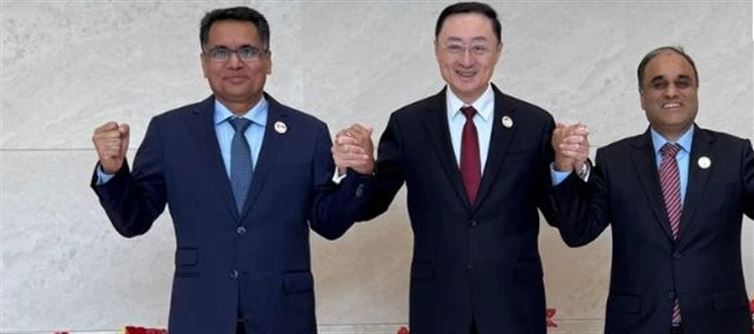
This is because of the recent first trilateral conference between china, bangladesh, and pakistan in Kunming, China. On june 19, Chinese, Pakistani, and Bangladeshi officials met for the first time, but the message was significant. The meeting was attended by Pakistan's Additional Foreign Secretary Imran ahmed Siddiqui, Bangladesh's Acting Foreign Secretary Ruhul Alam Siddiqui, and China's Deputy Foreign minister Sun Weidong. Amna Baloch, the foreign secretary of pakistan, took part via video link.
'Development Friendly Trilateral Dialogue' was the meeting's title, but it had much more diplomatic connotations. 'People-oriented development in the South Asian area' was the topic of the statement released following the conference. For india, however, it appears to be more of a strategic alignment than a diplomatic one, considering Bangladesh's executive leadership and its recent proximity to China.
Why is india becoming more worried about Bangladesh?
During his visit to china in march 2025, Prof. Mohammad Yunus, the Chief Advisor of the Interim government of bangladesh, characterized bangladesh as a Chinese political and economic partner. He had stated that china should enter bangladesh in order to access the Northeast indian market. Following this declaration, india on May 17th banned textile products from Bangladesh. As long as Sheikh Hasina was prime minister, bangladesh was seen as an important ally of India. But since Hasina's ouster, the Mohammad Yunus-led interim administration has gotten closer to china and Pakistan.
What is the danger of a 3.5 front war?
When discussing the "2.5 front war," General Bipin Rawat stated that india, along with china and pakistan, will have to deal with the issues of internal security and terrorism. However, given Bangladesh's role, this equation appears to be shifting presently.
Another new area of conflict is the Rakhine Corridor.
The latest discussions between the united states and bangladesh touched on the Rohingya issue. A 'humanitarian corridor' to Myanmar's Rakhine province has also been promoted by Dr. Khalilur Rahman, Bangladesh's national security advisor. From a strategic perspective, this region is extremely delicate for china, bangladesh, and India. America is now expressing interest in this field as well.
India needs to be ready.
India will need to abandon its strategic viewpoint in order to comprehend the new realities. On the diplomatic and defense fronts, it will need to give Bangladesh's problems more attention. Alongside this, Northeast India's border monitoring, economic blockade, and connection will need to be strengthened. "3.5 Front War" is becoming a reality rather than just a fiction. India will also need to be ready for it.




 click and follow Indiaherald WhatsApp channel
click and follow Indiaherald WhatsApp channel